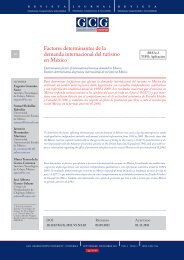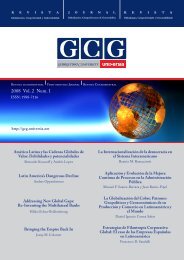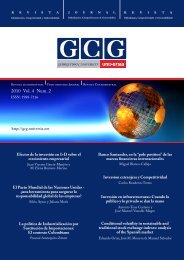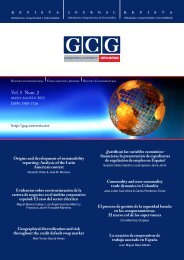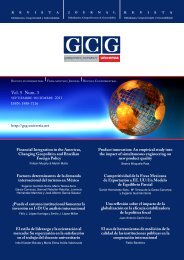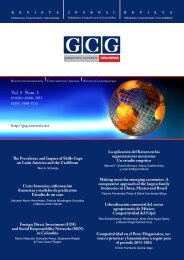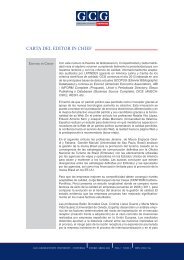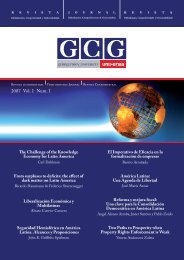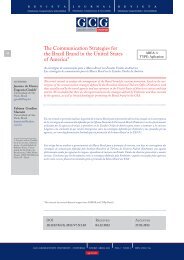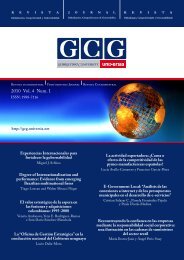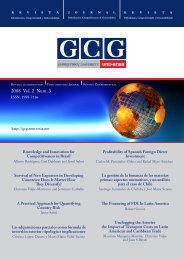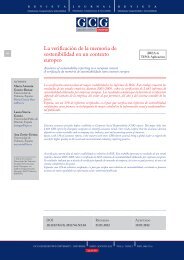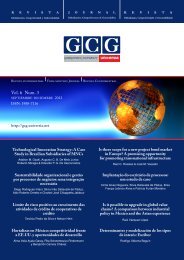Vol. 6 Num. 1 - GCG: Revista de Globalización, Competitividad y ...
Vol. 6 Num. 1 - GCG: Revista de Globalización, Competitividad y ...
Vol. 6 Num. 1 - GCG: Revista de Globalización, Competitividad y ...
You also want an ePaper? Increase the reach of your titles
YUMPU automatically turns print PDFs into web optimized ePapers that Google loves.
561. IntroductionClusters and industrial specialization have been of interest to researchers since the 19 thcentury. In the last <strong>de</strong>ca<strong>de</strong>s we have witnessed business and industrial clusters utilizedas a tool to enhance competitiveness at the regional and national level. In this paper weseek to i<strong>de</strong>ntify the different paths of the creation and outcome of clusters in the People’sRepublic of China (PRC) and Mexico. The driving questions are what the positive effectsof a cluster policy are, and what implications they have for policy makers and businesspeople.We consi<strong>de</strong>r clusters a tool that potentiates and provi<strong>de</strong>s fuel to a nation’s economicgrowth by linking the agents responsible for productivity and wealth creation. Thus, inor<strong>de</strong>r to disclose the effects that the clusters have had in the emerging economies ofboth the PRC and Mexico, in this research, we took the following steps. The first stepwas to <strong>de</strong>fine business and industrial clusters (presented in the next section). Once thatinformation was compiled, the common elements of the <strong>de</strong>finitions were grouped intocategories. Specifically, six dimensions and parameters were set for the advantages ofan industrial cluster: (1) agglomeration economies; (2) knowledge spillovers; (3) increasesin productivity and efficiency; (4) positive impact in the operation; (5) economic impact;and (6) sociopolitical impact. Those six elements plus (7) impact on competitivenesswere embodied in the dimensions of radars created to compare the cases of the PRCand Mexico.This study is useful for <strong>de</strong>cision makers. First, for the policy makers, it allows a full i<strong>de</strong>ntificationof the advantages of having an explicit cluster policy. Public entities may affectthe system by setting up an environment for productive business performance throughthe creation and enforcement of rules governing the operations of enterprises in the localeconomy. Second, for business people, it will gui<strong>de</strong> them to <strong>de</strong>termine the important variablesin the instauration of a business aggregation that will be helpful in creating wealth.For instance, it is important to have clusters (agglomerations of firms) in a region andmake organizing efforts a priority, so that these efforts can be translated into economic<strong>de</strong>velopment, since clustering offers such benefits.Key wordsBusiness Clusters,China, Mexico,Cluster PolicyPalabras claveClustersempresariales,China, Méjico,Política <strong>de</strong> clustersPalavras-chaveClustersEmpresariais,China, México,Política <strong>de</strong> ClustersThis paper is divi<strong>de</strong>d into five sections. In the first section we have a literature reviewregarding industrial and business clusters. In this section we analyze the <strong>de</strong>finition ofclusters, and highlight the common elements, disadvantages, and advantages found inthe literature related to clusters. The second section presents a profile of the industrialclusters in both the Chinese and Mexican cases and compares the policies used to implementclusters in the two countries. The third section shows the methodology used toconstruct radars that allow us to compare the impacts of the clusters. The fourth sectionmakes a comparison between China and Mexico in the seven cluster advantages dimensions.The last section presents some concluding remarks.JEL Co<strong>de</strong>sM13; F23<strong>GCG</strong> GEORGETOWN UNIVERSITY - UNIVERSIA ENERO-ABRIL 2012 VOL. 6 NUM. 1 ISSN: 1988-7116pp: 55-90



